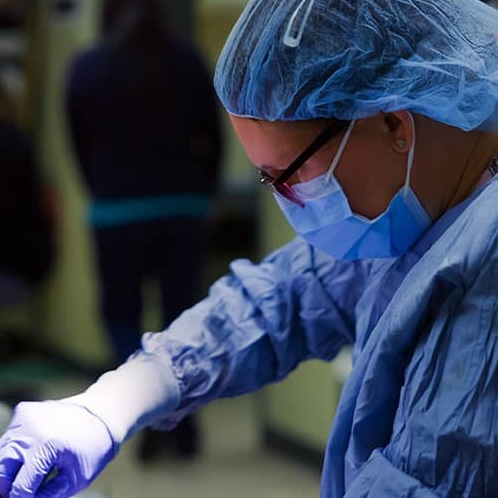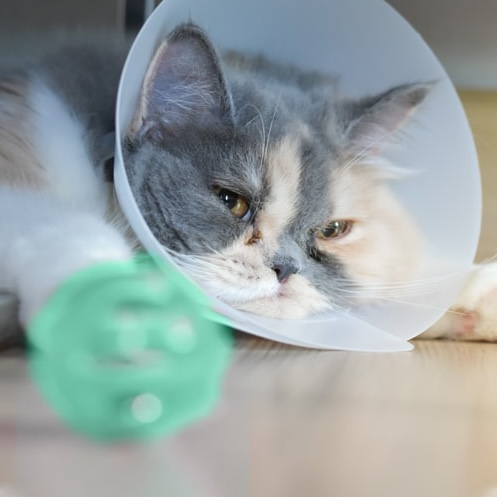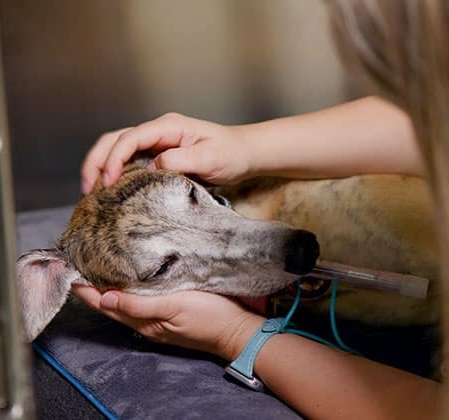Veterinary Surgery
Gold-standard facilities, advanced anesthesia protocols, and an incredible surgical team.

There’s no getting around it – surgery for our pets is always a little scary, even when the procedure is as simple as a spay or neuter.
It’s impossible not to worry about whether or not your best friend is ready and healthy enough for surgery, and, of course, there’s anesthesia and recovery time to consider. At Animal Hospital of Parkland, we’ve made our surgery-suite a worry-free zone by taking care to keep pet parents informed – and pet patients comfortable and safe – every step of the way, and by offering state-of-the-art facilities and equipment.
Support At Every Step
Surgery is often the most effective way to treat many serious injuries and disorders, and the team at Animal Hospital of Parkland is proud to perform surgeries in state-of-the-art facilities with cutting-edge equipment. Our hospital provides a full range of surgical services ranging from standard spaying and neutering to advanced, highly specialized procedures.
Our veterinary team will walk you through the entire process, giving you the tools to make informed decisions regarding your pet’s treatment options. We understand surgery is a stressful time for any owner, and we’re available every step of the way to answer questions and put your mind at ease.
Prior to any surgery, we conduct a thorough examination and pre-surgical blood work to confirm your pet’s good health. Our team of proficient veterinary professionals diligently monitors your pet during and after surgery, ensuring a secure and seamless recovery.
Surgical Procedures
Patient safety and comfort is our main priority during surgery. Our experienced veterinary team provides skilled pain management during and after all surgical procedures, ensuring your pet recovers quickly and with minimum discomfort. We utilize the safest available anesthetics to provide an extra margin of safety, especially for our older or high-risk patients. Using the most modern equipment, the patient’s vital signs are monitored during all anesthetic procedures.
Cara veterinary hospitals provide a full range of surgical services, including:
Spay & Neuter
In addition to preventing unwanted litters, spaying and neutering has many health and behavior benefits for pets. Talk to your veterinarian to see if this is the right decision for you and your pet, and for advice on the right age for performing this procedure.
Tumor Removals
Tumors can be either malignant or benign, but whatever the case may be, the safest choice might be to remove the bad cells altogether.
Gastrotomy/Enterotomy
In this surgery, an incision is made in your pet when we’ve determined that a foreign object is inside their stomach or intestinal tract that likely won’t pass through natural means.
Exploratory Surgery
Sometimes external diagnostics and bloodwork can’t tell us exactly what’s wrong with your pet. We can perform an exploratory surgery to identify the issue, and hopefully provide a treatment.
Cystotomy Surgery
This procedure is best described as a surgical incision created in the wall of the urinary bladder to either remove ailments such as bladder stones, bladder tumors, and blood clots or to procure a bladder biopsy.
Splenectomy
A ruptured spleen, tumor/cancer of the spleen, splenic torsion, or infection (to name a few) can occur in your pet. If this is the case, a splenectomy, or removal of the spleen, must take place.
Mastectomy
If your pet is suffering from a mammary tumor, a mastectomy, or removal of the mammary tumor, should be scheduled.
Ophthalmological Surgery
Some cases may require a specialist but many eye issues can be resolved by our team of doctors.
Pain Management
Whether your pet is undergoing a routine procedure, such as a spay or neuter, or more complex surgery, such as a foreign body removal, a multi-modal pain management protocol is essential. Pets who experience minimal discomfort from a surgical procedure heal much faster and develop fewer postoperative complications.
We provide pain medication before, during, and after your pet’s procedure to ensure they remain comfortable and don’t endure unnecessary discomfort. We will constantly monitor your pet’s pain level—which should be zero—and adjust their pain management plan as needed.
Advanced Anesthesia
While there is always a degree of risk involved with anesthesia, we utilize the safest available anesthetics and require pre-anesthetic blood testing to ensure that your pet is healthy enough to undergo surgery. Your pet’s vital signs will also be monitored throughout the procedure.
Our experienced veterinary anesthesiologists provide skilled pain management during and after all surgical procedures, ensuring your pet recovers quickly and with minimum discomfort. We’ll also make sure to go over the discharge details of caring for your pet after surgery, including what to expect, things to watch for, post-op medications and check-ups.



